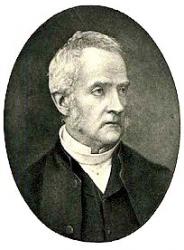Go Ad-Free
If you regularly use Hymnary.org, you might benefit from eliminating ads. Consider buying a Hymnary Pro subscription.
If you regularly use Hymnary.org, you might benefit from eliminating ads. Consider buying a Hymnary Pro subscription.

1 Day of wrath, O dreadful day!
When this world shall pass away,
and the heav'ns together roll,
shriv'ling like a dry, parched scroll;
long foretold by saint and sage,
David’s harp and prophet’s page.
2 Day of terror, day of doom,
when the Judge at last shall come,
through the deep and silent gloom,
shrouding ev'ry human tomb;
shall th'archangel’s trumpet tone
summon all before the throne.
3 Then the writing shall be read
which shall judge the quick and dear;
ten the Lord of all our race
shall appoint to each his place;
ev'ry wrong shall be set right
ev'ry secret brought to light.
4 O just Judge, to whom belongs,
vengeance for all earthly wrongs,
grant forgiveness, Lord, at last,
ere the dread account be past;
lo, my sighs, my guilt, my shame!
Spare me for Thine own great Name.
5 Thou, who bade the sinner cease
from her tears and go in peace;
Thou, who to the dying thief
spoke sweet pardon and relief;
Thou, O Lord, to me has giv'n,
e’en to me, the hope of heav'n.
Source: Our Great Redeemer's Praise #284
 Stanley, Arthur Penrhyn, Dean of Westminster, one of the most distinguished English Churchmen of the nineteenth century, was the son of Rev. Edward Stanley, Bishop of Norwich, and was born at Alderly, in Cheshire, December 13, 1815. At the age of fourteen he became a pupil of Dr. Arnold, of Rugby, in whose famous school he displayed a strength of moral character which was a prophecy of the frank and courageous man that was to be. He took well-nigh all the honors at Oxford, where he graduated in 1837. Entering the ministry of the Church of England, he filled successively various positions of honor and responsibility until in 1855 he was appointed Regius Professor of Ecclesiastical History at Oxford. In 1864 he became Dean of Westminster. His… Go to person page >
Stanley, Arthur Penrhyn, Dean of Westminster, one of the most distinguished English Churchmen of the nineteenth century, was the son of Rev. Edward Stanley, Bishop of Norwich, and was born at Alderly, in Cheshire, December 13, 1815. At the age of fourteen he became a pupil of Dr. Arnold, of Rugby, in whose famous school he displayed a strength of moral character which was a prophecy of the frank and courageous man that was to be. He took well-nigh all the honors at Oxford, where he graduated in 1837. Entering the ministry of the Church of England, he filled successively various positions of honor and responsibility until in 1855 he was appointed Regius Professor of Ecclesiastical History at Oxford. In 1864 he became Dean of Westminster. His… Go to person page >| First Line: | Day of wrath, O dreadful day! |
| Latin Title: | Dies Irae |
| Translator: | Arthur Penrhyn Stanley |
| Author: | Thomas of Celano |
| Language: | English |
| Copyright: | Public Domain |
14. Day of terror, day of doom. [A translation of the Dies irae.] By A. P. Stanley, from the Roman Missal, appeared in G. Redmond Portal's Hymns for Use of the Parish of Albury, 1864, in 9 stanzas of 6 lines. In 1868 it was given in Macmillan’s Magazine, and in 1869 in the Appendix to Hymns for Use in the Chapel of Marlborough Collection as, "Day of wrath, O dreadful day," with an additional stanza. The same was repeated in the Westminster Abbey Hymn Book, 1883. In the Hymnary1872, it is given, with the addition of 3 stanzas by the Editors ("Nought of Thee my prayers can claim"; "Make me with Thy sheep to stand"; and "Full of tears and full of dread"), and divided into three parts, pt. ii. being, "When, in that tremendous day," and pt. iii., "0 just Judge, to whom belongs." The ten-stanza form is repeated in a few American hymn-books, including Laudes Domini, 1884, and others.
- John Julian, Dictionary of Hymnology (1907)
14. Day of terror, day of doom. [A translation of the Dies irae.] By A. P. Stanley, from the Roman Missal, appeared in G. Redmond Portal's Hymns for Use of the Parish of Albury, 1864, in 9 stanzas of 6 lines. In 1868 it was given in Macmillan’s Magazine, and in 1869 in the Appendix to Hymns for Use in the Chapel of Marlborough Collection as, "Day of wrath, O dreadful day," with an additional stanza. The same was repeated in the Westminster Abbey Hymn Book, 1883. In the Hymnary1872, it is given, with the addition of 3 stanzas by the Editors ("Nought of Thee my prayers can claim"; "Make me with Thy sheep to stand"; and "Full of tears and full of dread"), and divided into three parts, pt. ii. being, "When, in that tremendous day," and pt. iii., "0 just Judge, to whom belongs." The ten-stanza form is repeated in a few American hymn-books, including Laudes Domini, 1884, and others.
- John Julian, Dictionary of Hymnology (1907)


 My Starred Hymns
My Starred Hymns